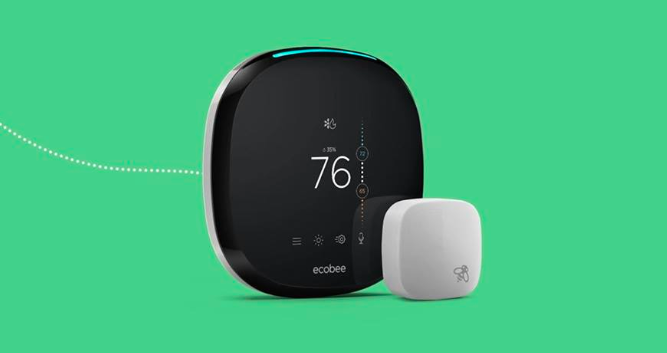Is Ecobee preparing to launch its own smart home system?
Increasing evidence suggests that Ecobee is preparing to launch a smart home system to rival those by Amazon-owned Ring and Google-owned Nest.
Ecobee already produces a smart thermostat, switch, and room sensors to help control your home's temperature, but leaked renders published on Twitter suggest the company is planning to launch a smart security camera and a door/window sensor, too.
Read More:
- Top smart thermostat to automate the heating and lower your bills in 2019
- Ecobee thermostats gain Peak Relief mode to save you money
- Google to kill IFTTT support for all Nest products on August 31
Given Amazon's investment in the company, Ecobee could offer a complete smart home system by adding these to the thermostat, switch, and room sensors, along with Alexa integration throughout.
The leaked renders were both published on Twitter by Dave Zatz of zatznotfunny.com. The indoor camera is expected to work similarly to Nest's Indoor Cam, while temperature, presence, and humidity sensors could send data to the Ecobee thermostat. That way, the heating in rooms where the camera detects presence will be increased on a cold day—similar to how Ecobee's existing room sensors work.
A month after the camera appeared on Twitter, Zatz posted a render of an Ecobee-branded sensor this week. Zatz said: "And...looks like an Ecobee contact sensor will also be joining the party!"
Contact sensors are often used to tell a smart home system the status of a window or door—in other words, whether it is open or closed. The two parts of the sensor use magnets to understand their proximity to one another, and a notification is sent to your smartphone when the two halves are separated—e.g. when a door opens.
And... looks like an ecobee contact sensor will also be joining the party! @rycrist@meganwollerton@rh_brownpic.twitter.com/oy7K2plGQt
— Dave Zatz (@davezatz) May 8, 2019
Ring, the smart home company Amazon owns, also sells contact sensors. So does Wyze, the budget smart home company that has just launched its Sense system. It includes two contact sensors, a motion sensor, and a bridge for connecting them to your router, all for $20.
A circular element on the leaked sensor looks to offer extra functionality. This could be a motion sensor, further enhancing the device's security credentials and providing another data point for the Ecobee thermostat. Alternatively, this could be a button to temporarily disable the sensor's alarm function when you want to open a door or window without the system notifying you.
Zatz later said on Twitter, in response to a question about a potential Ecobee humidity sensor, "There is a new sensor coming too... I can't tell you how it differs, but hopefully improved."
If Ecobee is preparing to offer a complete smart home system — comprising a thermostat, camera, and various sensors, all with Alexa control — it comes at an interesting time. Earlier this week, Google announced it is to make major changes to its Nest smart home system at the end of August, locking out many third parties (including IFTTT and potentially Alexa, too) from directly controlling Nest devices.
Instead, Google wants to lock down the system and partially control Nest devices.
We could soon see a consolidation across the smart home industry, with Google Nest in one corner and Amazon with Alexa and Ring in the other. The space in between is up for grabs and could be occupied by the likes of Hive, TP-Link, Wyze, and, of course, Ecobee.
After years of devices from hundreds of manufacturers all working together (often with a little help from a system like IFTTT), the next year or so could see some organization and consolidation but also a degree of segregation as giants like Amazon and Google construct their walled gardens in an apparent bid for greater customer security and privacy.
For the consumer, picking the right smart home system could be temporarily tricky. Do you go for Amazon now and hope its Alexa/Ring solution will meet your future needs? Do you lock yourself into Google and Nest, knowing these devices may not play well with others? Or do you opt for an alternative, like Hive, Wyze, or what Ecobee appears to be working on?
Amazon and Google have indeed asserted themselves, but there is still a lot of land up for grabs, and Ecobee knows it.
